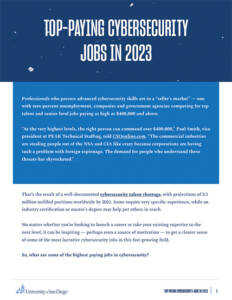Are you a member of the Armed Forces or a military veteran who’s looking for a meaningful new career after serving your country? If so, you’ll want to explore a fast-growing field where there is an urgent demand for many of the skills you’ve developed in the military — cybersecurity.
For those with military experience, working in the critically important arena of cybersecurity is an opportunity to continue to serve your country, this time combating the widespread and ever-growing threat of cyber crime.
“Cybersecurity is a great way to continue serving our country, just on a different battlefield.”
Says Donald Greene, a 23-year Air Force veteran now working as a cybersecurity analyst for RBR Technologies. “In this position, I continue my commitment to my country by defending the Department of Defense Information Networks. I love the mission-based aspect of my job.”
“The cybersecurity industry is undergoing a severe talent shortage, putting our communities, economies and nation at risk. If you have an interest in technology, I encourage you to explore your options,” Greene writes in an article titled “Careers in Cybersecurity: 5 Ways to Get Started.”
Answering the Call: Military Vets Ideal for Cybersecurity Mission
When it comes to advocating career opportunities for military veterans, Greene and others are sounding a reveille call. Here, we’ll take a closer look at some of the many factors that make cybersecurity an extremely promising career option for military service members and veterans.
But first, a quick recap:
- The mission is critical: Public and private sector organizations are literally under siege. Security Boulevard reports that the cost of cyber crime is expected to top $10.5 trillion annually by 2025.
- The pay is high: The average salary for “entry level cyber security” positions ranges from approximately $46,000 per year for Network Systems Operator to $133,000 per year for Principal Software Engineer, according to Indeed.
- The jobs are plentiful, and the talent shortage is real. Citing an average annual salary of $103,590, the U.S. Bureau of Labor Statistics expects the number of new jobs for information security analysts will grow 33% between 2020 and 2030.
For military service members and veterans, a career in cybersecurity is a chance to do important work and get paid well for your efforts.
Why Employers Seek Military Veterans for Cyber Security Jobs
You know you’ve developed some formidable skills and professional qualities during your time serving your country in the military — including experiences that will serve you well in the civilian workforce. But what makes vets so attractive to potential employers? Here’s a quick rundown of some of the key attributes that make members of the Armed Services and military veterans sought-after candidates for cybersecurity jobs:
- Learning agility and problem solving
- Leadership capabilities and experience
- Experience working in high-pressure situations
- Experience working in roles where lives and safety are at stake
- Respect for the importance of discipline and process
- Ability to obtain and maintain security clearance
- Mission-driven: accustomed to working with a shared sense of purpose
- High personal drive; motivated by pursuit of excellence
- Loyalty, dedication and teamwork
Top companies are not only on the lookout for talented veterans, they are actively recruiting for key cybersecurity jobs. Some are even partnering with military advocacy organizations like HirePurpose.
A recent report on such efforts (These 7 Companies With Cybersecurity Jobs Are Seeking Veterans) also cites accounting giant PwC, which operates an in-house cybersecurity for veterans program that led to the hiring of 250 vets in 2016.
“Veterans bring a special breed of leadership and experience to the workforce, an unflappable presence during times of crisis and uncertainty,” said Dan Verton, Director of Content Marketing at Cybereason in a 2022 Veterans Day message.
Government agencies at the federal, state and local level are also intensifying their efforts to recruit military talent to fight the war on cyber crime. For example, the commonwealth of Virginia leveraged industry partnerships to launch a comprehensive Cyber Vets Virginia initiative — now, program participants are graduating into some of the thousands of available state jobs. Other states are getting into the act as well.
Types of Cyber Jobs Active Military Members May Have
First, let’s examine the types of active military jobs that would translate well to cyber-related positions in other industries and companies. The good news — there are many.
The Army’s Cyber & Technology webpage lists the following positions in which service members “get the skills and training needed to defend the nation from cybersecurity threats in the Army Cyber Corps.”
- Cyber and Electronic Warfare Officer: This person is chiefly responsible for cyber protection and integration. Responsibilities include conducting and coordinating cyber attacks and facilitating protection and warfare support.
- Cyber Operations Officer: A skilled professional in this role will conduct offensive and defensive cyber operations “by targeting hostile enemy activities and capabilities.”
- Cryptologic Intelligence Analyst: This type of analyst will “maintain and analyze databases of information used to locate and identify targets.” Responsibilities include “identifying operational patterns within a computer, written, voice or video communication.”
- Cyber Network Defender: This position entails performing “specialized computer network defense duties, including infrastructure support, incident response, auditing and managing.”
- Cyber Operations Specialist: In this role, a Cyber Operations Specialist uses advanced skills to defend the Army’s weapon systems, which include satellites, navigation and aviation systems.
A recent search of open positions on the Army’s website found the following job titles, which fall under the umbrella of jobs we just outlined. These are additional examples of military roles that could translate well to civilian cyber-related positions.
- Military Intelligence Systems Maintainer/Integrator
- Geospatial Intelligence Imagery Analyst
- Electronic Warfare Specialist
- Information Technology Specialist
- Human Intelligence Collector
Benefits for Veterans — What Universities Have to Offer
Many colleges and universities offer military benefits that help ease the transition from active duty positions to other careers. As you explore your options, consider this helpful list of resources.
The U.S. Department of Veterans Affairs website is a good place to start. Discover college tuition options, tips for finding the right school and how to obtain free educational and career counseling. You can also explore education assistance programs and learn whether you are eligible for the GI Bill or other benefits.
This program “supports veterans and service members who are transitioning from military to college life.” Vocational rehabilitation counselors are located at more than 100 college campuses across the United States.
This website provides information for active duty members, reservists, National Guard, veterans, and military spouses and families. Learn more about veteran-friendly colleges, online education options, benefits by military branch and specific Department of Veterans Affairs programs.
This government-funded program can help veterans pay for tuition and fees that are not covered by the post-9/11 GI Bill. You can also use this resource to find out if particular colleges or universities participate in the Yellow Ribbon Program.
It’s also important to compare higher education institutions as many colleges and universities offer additional benefits for veterans, which may include:
- Tuition breaks
- Scholarships
- Priority registration for classes
- Academic credit for military training
- Specialized services
- Free parking
Many military service members and veterans take advantage of benefits and resources like these to enroll in career-building educational programs, such as a master’s degree.
Post-Service Training Available to Veterans
If you are looking to sharpen your skills or advance your post-military career, consider training programs specifically designed and available for veterans.
- The Veteran Readiness and Employment program through the U.S. Department of Veterans Affairs helps veterans who “have a service-connected disability that limits your ability to work or prevents you from working.” The program aids in finding employment and helps target specific education or training needs.
- Creating IT Futures, the leading charity of CompTIA, is a nonprofit that “encourages an IT patch for populations that traditionally have been under-represented in the information technology workforce, such as women, people of color and veterans.”
- The goal of IBM’s Veteran Employment Accelerator is to help “military veterans prepare for careers in advanced data analytics by offering training and certification, and job placement assistance.”
- Billing itself as “a fully sponsored ‘veterans first’ workforce development initiative dedicated to transitioning veterans,” CyberVET helps veterans who are considering a career in technology with minimal or no IT or coding experience. The program offers a “high intensity, industry-recognized IT training program” with a veteran-only cohort. The full-time program takes 4–6 months to complete.
- Hire Our Heroes provides resources, courses, resume-building tips and other helpful job training materials for veterans who are looking to transition to a post-military career.
- The Federal Virtual Training Environment (FedVTE), which is run by the Department of Homeland Security along with Hire Our Heroes, provides free online cybersecurity training to U.S. military veterans. Users must create an account to access all of the materials.
- The National Initiative for Cybersecurity Careers and Studies offers a free downloadable resource — Cybersecurity Training and Education for Veterans: A user guide for those who formerly served in the U.S. Armed Forces.
Importance of Cybersecurity Clearances
If you are currently serving (or have served) in the military, you understand the importance of holding a security clearance.
There are three levels of security clearances — confidential, secret and top secret. The Department of State’s Bureau of Global Talent Management decides which government positions will require a security clearance, in addition to the clearance level.
Just like with some active duty military positions, there are many cybersecurity-related careers that require a security clearance.
As the U.S. Department of State explains: “A security clearance allows an individual filling a specific position to have access to classified national security information up to and including the level of clearance that they hold as long as the individual has a “need to know” the information and has signed a non-disclosure agreement.
Best Career Paths for Veterans
The good news is that the dedication, skills, government knowledge and experience you acquire with a military career can translate well to a variety of cybersecurity-related positions. Here are some of most popular:
- Security Consultant: This type of consultant will typically assess the security and risk of a business or organization and ultimately provide solutions and recommendations on safety measures and protect.
- Network Administrator: A person in this position manages and maintains technological networks, often working within organizations and government agencies to oversee a variety of different systems.
- Cybersecurity Analyst: As a cybersecurity analyst, you will plan and implement security measures to protect the computer networks and systems of a company or organization.
- Security Auditor: A security (or cybersecurity) auditor works with companies and organizations to provide comprehensive audits of online security systems.
- Cybersecurity Specialist: Often called information (IT) security specialists or network security specialists among other related job titles, a person in this position plays a central role in securing the information systems of businesses and other organizations.
- Cybersecurity Architect: This senior-level position is responsible for planning, designing, testing, implementing and maintaining an organization’s computer and network security infrastructure.
- Cybersecurity Engineer: Sometimes called information security engineers, cybersecurity engineers identify threats and vulnerabilities in systems and software, then apply their skills to developing and implementing high-tech solutions to defense against all types of cyber crime.
Steps Veterans Should Take to Get Started in Cybersecurity
If you’re interesting in pursuing a cybersecurity career, here are some helpful tips:
- Seek out the right opportunities. This includes networking events, internships, bootcamps, training programs, etc. It’s also a good idea to mix cyber-specific opportunities with general career programs and topics, such as resume and cover letter workshops and mock interviews.
- Connect with other veterans. LinkedIn is a great place to start since it’s one of the top job networking sites and a place where you can join veteran-specific groups that allow you to connect with veterans who may currently work in cybersecurity positions.
- Explore higher education options. Many advanced degree programs in cybersecurity offer special assistance and resources for veterans.
Cybersecurity Career Resources for Veterans
The National Institute for Cybersecurity Careers and Studies (NICCS) is among the many organizations whose mission is to connect veterans with meaningful employment that leverages skills developed during their service.
Part of the Department of Homeland Security, NICCS offers advice, support, toolkits and free training to veterans interested in launching a career in cybersecurity. The demand for cybersecurity experts, it reports, is “growing 12 times faster than the current U.S. job market,” making this field “one of the most highly sought-after careers in the country.”
Conducting your own reconnaissance into cybersecurity career opportunities reveals no shortage of helpful articles and reports. Here is just a small sampling:
- Starting a Career in Cybersecurity: A Guide for Veterans
- Companies Ramp Up Recruiting Veterans as Cybersecurity Urgency Grows
- Boots on the Ground: New Collar Careers Bring Military Veterans to the Cybersecurity Battlefield
Take Command of Your Career in Cybersecurity
All of this — the high stakes, the sense of mission, the urgent need for military skills and discipline, the crucial talent shortage and the excellent pay being earned by cybersecurity professionals across the country — adds up to an exciting career path that is definitely worth exploring.
In the words of Donald Greene, the career Air Force vet who reinvented himself as a cybersecurity analyst: “If you are a transitioning veteran who likes technology, wants to utilize your military skills and desires a career with great growth opportunities and strong six-figure earning potential, you should consider cybersecurity.”
Regarding master’s degree opportunities, the top-rated University of San Diego offers two graduate degree programs in this vitally important field — the innovative, 100% online Master of Science in Cyber Security Operations and Leadership and the on-campus Master of Science in Cyber Security Engineering.
Veterans should also be aware of military tuition assistance programs that make investing in your education more affordable, including the G.I. Bill and the VA’s Yellow Ribbon Program. Many of the veterans who enroll at University of San Diego, for example, are pleasantly surprised to discover that they qualify for financial assistance that covers much of the cost of tuition. USD takes great pride in supporting military veterans who decide to advance their education and in connecting you with information about your available benefits.
Contact USD today to learn more.






